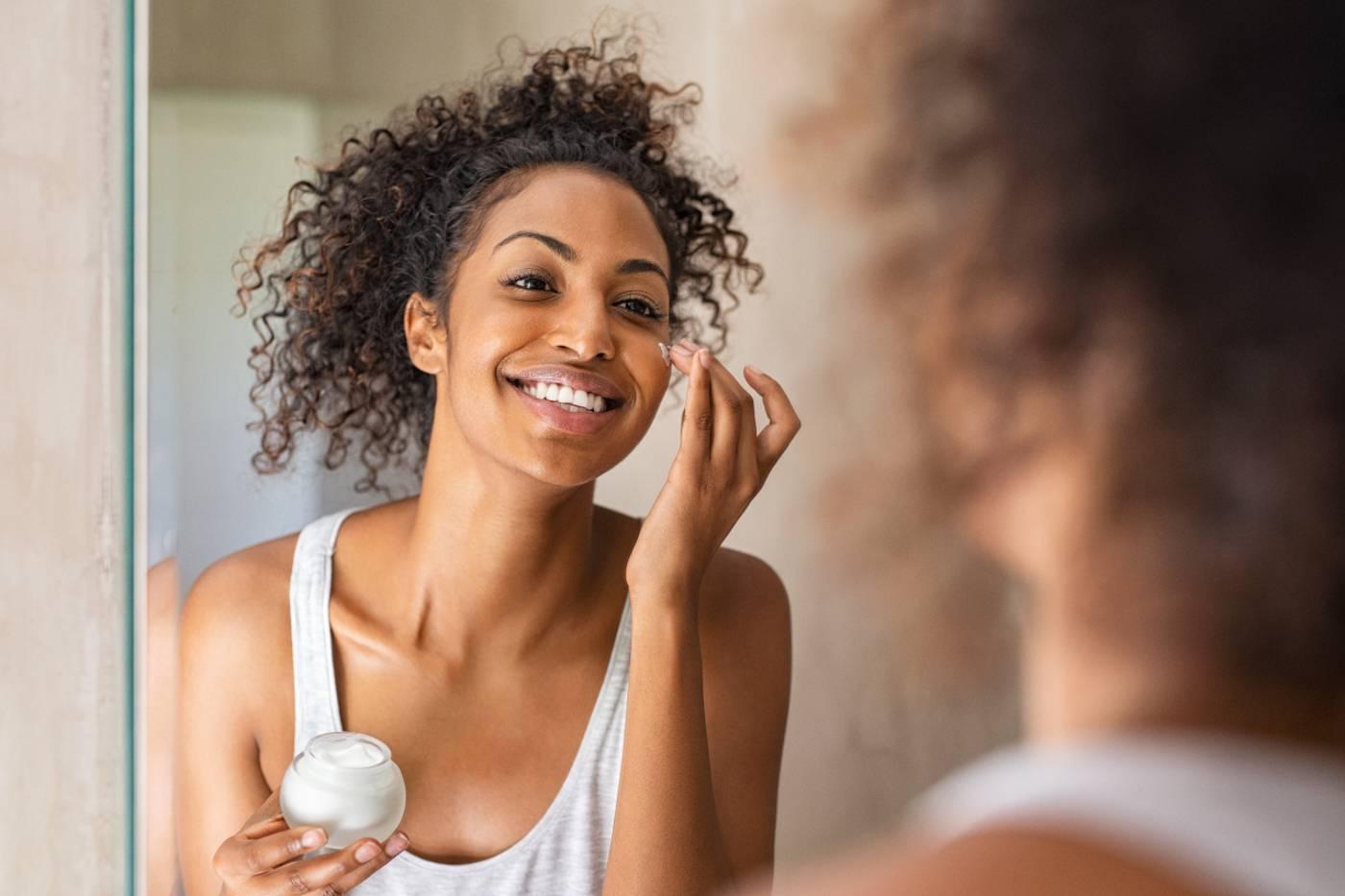PREGNANCY
Your Guide to Pregnancy-Safe Skincare
Before you slather on your usual skincare products, learn which ingredients are safe—and which to avoid—when expecting.

Written by
Holly Pevzner

You’ll experience lots of changes during pregnancy—and your skin will not be spared! Some pregnancy skin changes are great (hello, glow!) and some are less so (looking at you, acne). Depending how your skin reacts to the unavoidable hormone surge that occurs when you’re expecting, you may wind up with dry or greasy patches, itchy skin, dark spots, stretch marks, new-to-you moles, and more. You may even find that your most beloved skincare products are suddenly too harsh for your newly sensitive skin, or worse, unsafe for your baby!
For help morphing your go-to skincare routine into a pregnancy-safe skincare routine, keep reading.
Skincare Ingredients to Avoid While Pregnant
You might be surprised that there are a lot of super-common skincare ingredients that are not safe to use while pregnant. So, the first step in creating your new pregnancy skincare routine is to scan the ingredients label of the skincare products you already have. Some ingredients to avoid during pregnancy include:
-
Retinoids: Retinol and tretinoin are both examples of retinoids, aka wrinkle and acne miracle-workers. While very little gets absorbed into the skin, studies have suggested a possible link to birth defects. Until there’s more data, it’s recommended you avoid topical retinoids during pregnancy. Retinoids include Altreno, Atralin, Avage, Avita, Differin, Fabior, Renova, Retin-A, and Tazorac. Accutane (isotretinoin), an oral retinoid, is also a big no for pregnancy. - Hydroquinone: You’ll find hydroquinone in skin brightening products, plus hair color/bleaching—and you need to avoid it while pregnant. According to the March of Dimes, hydroquinone can cause cancer, DNA damage, and endocrine disruption.
- Endocrine-Disrupting Chemicals (EDC): EDCs include phthalates, parabens, and triclosan, which can be found in various personal care products and fragrances. The American College of Obstetrician and Gynecologists (ACOG) notes that they should be avoided during pregnancy whenever possible. That’s because EDCs have been shown to increase the odds of preterm birth, decreased gestational age at birth, birth weight, and body length.
- Oxybenzone: While using sunscreen is always recommended, ACOG urges folks to avoid sunscreens containing oxybenzone during pregnancy. For one, a 2019 report suggests that exposure to oxybenzone may put developing fetuses at risk for certain birth defects.
Is fragrance bad for pregnancy?
It can be! That’s because when you spot the super-vague word “fragrance” on, say a lotion or toner label, there’s no way of knowing what exactly makes up that scent. In fact, the term “fragrance” simply means that your product contains one or more of the 3,000+ ingredients used in fragrance compounds—some of which contain harmful chemicals. For example, endocrine-disrupting chemicals, like phthalates and parabens are regularly found in fragrance additives, which have been shown to increase the odds of preterm birth. That’s why ACOG recommends pregnant individuals look for products marked “fragrance free.” This, by the way, is not the same as “unscented.” Unscented products still can contain scents—and harmful chemicals. It’s just that those scents are designed to hide odor.
Is salicylic acid safe during pregnancy?
Salicylic acid is a master exfoliator and a straight-up game changer for many with acne—and those simply looking to brighten their competition. But there’s some confusion about if salicylic acid is safe to use during pregnancy. Topical salicylic acid (aka beta hydroxy acid or BHA) is safe during all trimesters of pregnancy—and breastfeeding, according to the ACOG. That’s because the amount of salicylic acid that’s absorbed into the body is “negligible.” But there is one big caveat: Pregnant individuals should not apply salicylic acid over a large area of their body for a prolonged period of time—or under any kind of dressings or wrap. In other words, if you’re itching to get a salicylic acid peel while pregnant, you’re going to want to reconsider. Salicylic acid peels are not recommended during pregnancy because the structure of salicylic acid is closely related to that of aspirin—and aspirin has been associated with miscarriage, birth defects, bleeding, and more. Good news for facial lovers: Alpha hydroxy acid (AHA) peels can be used safely in pregnancy.
Is cellulite cream safe during pregnancy?
If you are among the 80 to 90% of women who have cellulite, you may be wondering if it’s safe to use cellulite cream during pregnancy. The answer is: That depends! If your cellulite cream contains retinol, you should definitely shelve it throughout your pregnancy. The same holds true for cellulite creams that feature theobromine, theophylline, or aminophylline on the ingredient list Another popular cellulite cream ingredient is caffeine, which is deemed relatively safe during pregnancy in concentrations less than 5%. But if you’re extra sensitive to caffeine or are a big coffee drinker, it may be a good idea to discuss your overall caffeine use with your healthcare provider. By the way, if you are wondering if caffeine-infused cellulite creams actually work, the American Academy of Dermatology Association (AAD) noted that daily application of caffeine-infused lotion may help dehydrate cells, which can sometimes make cellulite appear less obvious. (Learn more about recommended caffeine intake during pregnancy.)
What sunscreen is safe during pregnancy?
While the AAD doesn’t offer any specific advice for which sunscreens to use during pregnancy, other experts recommended using only physical (aka mineral) sunscreens containing titanium oxide and zinc oxide while you’re expecting. (Physical sunscreen works on the surface of the skin, while chemical sunscreen is absorbed.) Plus, ACOG urges pregnant folks to avoid the popular chemical sunscreen ingredient oxybenzone during pregnancy, whenever possible.
There’s evidence that far more oxybenzone is absorbed through the skin than what was originally thought—and one study suggested that the ingredient may even put developing fetuses at risk for certain birth defects. (Learn how to keep your newborn sun-safe!)
How to Safely Treat Melasma While Pregnant
While pregnancy is a common cause of melasma, a skin problem marked by brown or gray patches on your face, the go-to treatment is hydroquinone…which should not be used during pregnancy. Before you scream into a pillow, know that there are alternative melasma treatments that are safe to use during pregnancy, like alpha hydroxy acid. (A 2022 report in the Journal of Clinical and Aesthetic Dermatology affirms that AHA is safe to use during pregnancy.) It’s also super important to wear sunscreen because UV exposure worsens melasma! While expecting, opt for a physical sunscreen such as titanium oxide and zinc oxide, since they sit atop your skin, as opposed to getting absorbed.
How to Safely Treat Acne While Pregnant
Here’s another injustice of pregnancy: Pregnancy hormones, especially in the first two trimesters, increase the amount of oil your skin produces, which means there’s potential for more clogged pores and more pimples. With all things retinoid off limits during pregnancy, there’s a good chance your favorite pimple treatment is among them. If you’re on prescription acne medication, such as isotretinoin (Accutane), spironolactone (CaroSpir, Aldactone), tazarotene (Fabior, Tazorac, Avage), or tetracycline, you’ll need to put those on pause as well.
But that doesn’t mean you’re destined to endure nine months of acne. Experts note that products containing the following are safe to use during pregnancy:
-
Azelaic acid - Benzoyl peroxide
- Glycolic acid
- Salicylic acid
Prescribed acne treatments that contain erythromycin (Erygel, Erythra-Derm) and clindamycin (Cleocin T, Clindagel, others), which are topical antibiotics, are A-okay. But prescription-only Dapsone + BPO (Aczone) is only safe to use during the first and second trimester, and should not be used during your third trimester. The good news? If you’re plagued with pregnancy acne, know that your skin should start to clear in the third trimester or soon after your little one is born!
Bottom Line on Pregnancy Skincare
Take heart: In all likelihood, you do not have to trash your entire skincare regimen during pregnancy! Simply scan your labels, note ingredients that could be concerning, then chat with your OB/GYN, midwife, and/or your dermatologist for personalized pregnancy skincare advice.
More on Common Pregnancy Safety Concerns:
- Can I Have a Glass of Wine While Pregnant?
- Is It Safe to Use Marijuana or CBD During Pregnancy?
- Is Eating Fish During Pregnancy Safe?
- Is Third Trimester Sex Safe?
- The Happiest Baby x EWG Clean Pregnancy Guide
***
REFERENCES
- Safety of skin care products during pregnancy. Canadian Family Physician. June 2011
- March of Dimes: Isotretinoin and other retinoids during pregnancy
- March of Dimes: Personal Care Products and Cosmetic Use During Pregnancy
- The American College of Obstetricians and Gynecologists (ACOG): Toxic Chemicals: Steps to Stay Safer Before and During Pregnancy
- Can oxybenzone cause Hirschsprung's disease? Reproductive Toxicology. June 2019
- ACOG: Skin Conditions During Pregnancy
- Treatment of Acne Vulgaris During Pregnancy and Lactation: A Narrative Review. Dermatology and Therapy. November 2022
- A review of the safety of cosmetic procedures during pregnancy and lactation. International Journal of Women's Dermatology. March 2017
- Salicylic acid as a peeling agent: a comprehensive review. Clinical, Cosmetic and Investigational Dermatology. August 2015
- Cleveland Clinic: Cellulite
- Skin Changes and Safety Profile of Topical Products During Pregnancy. The Journal of Clinical and Aesthetic Dermatology. February 2022
- American Academy of Dermatology Association (AAD): Cellulite Treatments: What Really Works?
- Penn Medicine: How to Choose Your Sunscreen
- Consumer Reports: What You Need to Know About Sunscreen Ingredients
- National Library of Medicine, StatPearls: Melasma
- UNM Health: Pregnancy Acne: Top 3 Questions, Answered
- Mayo Clinic: What's the best way to treat pregnancy acne?
Disclaimer: The information on our site is NOT medical advice for any specific person or condition. It is only meant as general information. If you have any medical questions and concerns about your child or yourself, please contact your health provider.
SHARE THIS ARTICLE
MOST LOVED
Sleepytime Sidekicks
More on Pregnancy
About Holly Pevzner
Holly Pevzner is Happiest Baby’s Staff Writer. She specializes in creating parenting, pregnancy, health, nutrition, and family travel content. Her work—including essays, columns, reported features, and more—has appeared in outlets such as EatingWell, Family Circle, Parents, Real Simple, and The Bump. Before becoming a full-time writer, Holly held senior staff positions at Prevention, Fitness, and Self magazines, covering medical health and psychology. She was also a contributing editor at Scholastic Parent & Child magazine and a regular kids-health columnist for Prevention and First For Women magazines. Holly lives in Los Angeles with her husband, two boys, and terrier mix.












